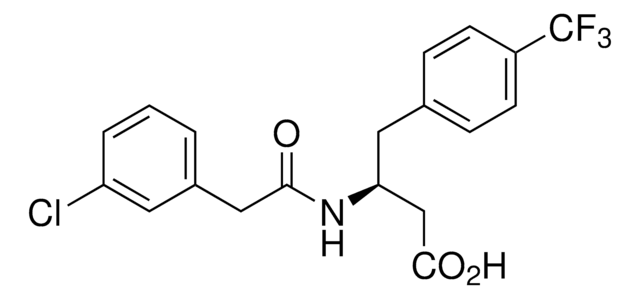371725
GPR43 (FFA2) Agonist
The GPR43 (FFA2) Agonist controls the biological activity of GPR43. This small molecule/inhibitor is primarily used for Biochemicals applications.
Synonym(s):
GPR43 (FFA2) Agonist, (S)-2-(4-chlorophenyl)-3,3-dimethyl-N-(5-phenylthiazol-2-yl)butanamide
Sign Into View Organizational & Contract Pricing
All Photos(1)
About This Item
Empirical Formula (Hill Notation):
C21H21ClN2OS
CAS Number:
Molecular Weight:
384.92
UNSPSC Code:
51111800
NACRES:
NA.77
Recommended Products
Quality Level
Assay
>98% (HPLC)
form
solid
manufacturer/tradename
Calbiochem®
storage condition
OK to freeze
color
white
solubility
DMSO: 50 mg/mL
shipped in
ambient
storage temp.
2-8°C
General description
A phenylacetamide compound that acts as an allosteric agonist of FFA2 (GPR43), demonstrating a left-shifted acetate dose response (IC50 = 0.7 µM) and 111% efficacy relative to acetate in hFFA2 forskolin-induced cAMP assays.
Warning
Toxicity: Standard Handling (A)
Reconstitution
Following reconstitution, aliquot and freeze (-20°C). Stock solutions are stable for up to 3 months at -20°C.
Other Notes
Wang, Y., et al. 2009. Bioorg. Med. Chem. Lett.20, 493.
Legal Information
CALBIOCHEM is a registered trademark of Merck KGaA, Darmstadt, Germany
Storage Class Code
11 - Combustible Solids
WGK
WGK 3
Flash Point(F)
Not applicable
Flash Point(C)
Not applicable
Certificates of Analysis (COA)
Search for Certificates of Analysis (COA) by entering the products Lot/Batch Number. Lot and Batch Numbers can be found on a product’s label following the words ‘Lot’ or ‘Batch’.
Already Own This Product?
Find documentation for the products that you have recently purchased in the Document Library.
Sandra M Holmberg et al.
Nature communications, 15(1), 3502-3502 (2024-04-26)
Beneficial gut bacteria are indispensable for developing colonic mucus and fully establishing its protective function against intestinal microorganisms. Low-fiber diet consumption alters the gut bacterial configuration and disturbs this microbe-mucus interaction, but the specific bacteria and microbial metabolites responsible for
Anne Ørgaard et al.
Islets, 11(5), 103-111 (2019-08-31)
The intestinal microbiota has been demonstrated to influence host metabolism, and has been proposed to affect the development of obesity and type 2 diabetes (T2D), possibly through short-chain fatty acids (SCFAs) produced by fermentation of dietary fiber. There are some
Signe Schultz Pedersen et al.
The FEBS journal, 291(3), 566-583 (2023-11-21)
Butyrate, a gut microbial metabolite, has beneficial effects on glucose homeostasis and has become an attractive drug candidate for type 2 diabetes (T2D). Recently, we showed that butyrate protects pancreatic beta cells against cytokine-induced dysfunction. In this study, we explored
José Luís Fachi et al.
The Journal of experimental medicine, 217(3) (2019-12-27)
Antibiotic-induced dysbiosis is a key predisposing factor for Clostridium difficile infections (CDIs), which cause intestinal disease ranging from mild diarrhea to pseudomembranous colitis. Here, we examined the impact of a microbiota-derived metabolite, short-chain fatty acid acetate, on an acute mouse
Yongguo Li et al.
Cell reports, 29(12), 4099-4113 (2019-12-19)
Recruitment of brite/beige cells, known as browning of white adipose tissue (WAT), is an efficient way to turn an energy-storing organ into an energy-dissipating one and may therefore be of therapeutic value in combating obesity. However, a comprehensive understanding of
Our team of scientists has experience in all areas of research including Life Science, Material Science, Chemical Synthesis, Chromatography, Analytical and many others.
Contact Technical Service


![Poly[(R)-3-hydroxybutyric acid] natural origin](/deepweb/assets/sigmaaldrich/product/structures/129/476/7d1c924b-f644-4889-a2d6-d7a923ce382c/640/7d1c924b-f644-4889-a2d6-d7a923ce382c.png)



